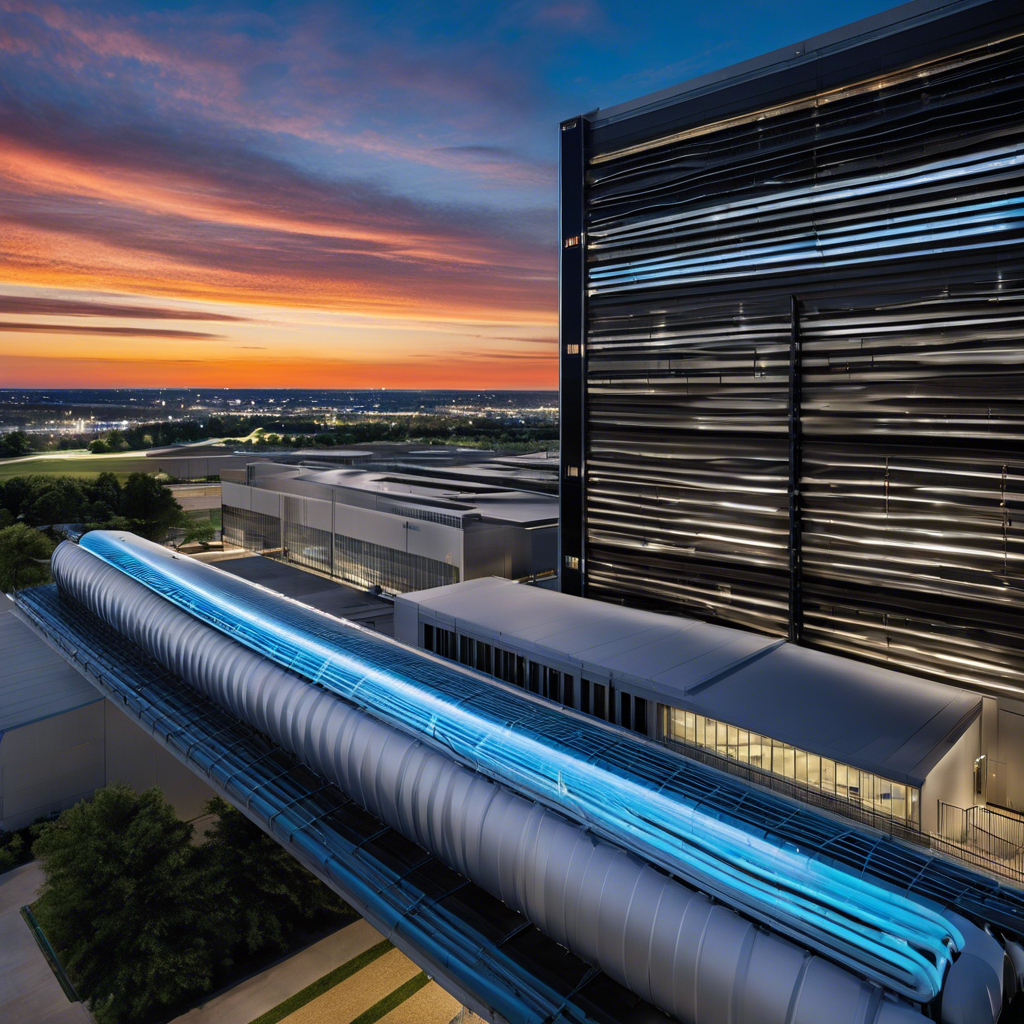Have you ever stopped to consider the intricate dance between technology and climate control?
In the world of data centers, where the pulse of information beats incessantly, the impact of HVAC systems on cooling is both crucial and complex.
As you step into the realm of data center cooling in Tulsa, you will uncover a myriad of challenges and considerations that govern the delicate balance between maintaining optimal temperature and humidity levels while ensuring the efficiency and performance of these vital facilities.
But how exactly does HVAC shape the landscape of data center cooling in Tulsa?
Well, let’s explore this captivating topic together, shall we?
Key Takeaways
- Proper maintenance and optimization of HVAC systems in data centers are crucial for efficient cooling and energy consumption.
- Overcoming the challenges of data center cooling in Tulsa requires careful planning and implementation.
- Maintaining optimal temperature and humidity levels is essential to prevent equipment failure and increased energy consumption.
- Implementing strategies like hot aisle/cold aisle containment systems and advanced airflow management techniques can improve cooling efficiency and reduce energy consumption.
Importance of HVAC Systems in Data Centers
The HVAC system plays a crucial role in maintaining optimal temperature and humidity levels within data centers, ensuring the reliable operation of equipment and preventing potential damage.
Proper HVAC system maintenance is essential to ensure that the system functions efficiently and effectively. Regular inspections and cleaning of filters can help prevent dust and debris buildup, which can hinder airflow and decrease cooling capacity. Additionally, routine maintenance tasks such as lubricating motors and checking refrigerant levels can optimize energy consumption and reduce overall operating costs.
Energy consumption optimization is a significant concern for data centers, as they require substantial power to operate. By ensuring that the HVAC system is well-maintained, data center operators can minimize energy waste and maximize the efficiency of their cooling systems, leading to significant cost savings and improved environmental sustainability.
Challenges in Data Center Cooling in Tulsa
To address the unique cooling requirements of data centers in Tulsa, several challenges must be overcome.
One major challenge is the high energy consumption associated with data center cooling. Data centers require a significant amount of power to operate and maintain the cooling infrastructure. This can lead to high energy bills and environmental concerns.
Another challenge is the complexity of the cooling infrastructure itself. Data centers require a precise and efficient cooling system to maintain optimal temperature and humidity levels. Achieving this level of precision can be difficult and requires careful planning and implementation.
Additionally, the increasing power density of modern data centers poses a challenge for cooling. As data centers become more densely packed with servers, the cooling systems must be able to handle the increased heat load.
Overcoming these challenges is crucial for ensuring efficient and reliable data center cooling in Tulsa.
Optimal Temperature and Humidity Levels for Data Centers
Maintaining optimal temperature and humidity levels is crucial for efficient data center operation.
The temperature in a data center should be maintained between 18°C and 27°C (64°F and 80°F), while the relative humidity should be kept between 40% and 60%. These ranges are considered ideal for the reliable and safe operation of IT equipment.
Deviating from these levels can lead to equipment failure, increased energy consumption, and reduced operational efficiency.
By ensuring the correct temperature and humidity levels, data center operators can prevent the risk of overheating and condensation.
Overheating can cause equipment malfunctions and even permanent damage, while excessive humidity can lead to moisture buildup and corrosion.
These issues not only compromise the performance of the IT equipment but also increase the risk of system downtime.
To maintain optimal temperature and humidity levels, a well-designed cooling infrastructure is essential.
This includes precision cooling systems, such as computer room air conditioners (CRACs) and in-row cooling units, that can provide accurate and efficient cooling to the IT equipment.
Additionally, proper airflow management and insulation can help optimize cooling and reduce energy consumption.
Strategies for Efficient HVAC Cooling in Data Centers
Ensuring optimal temperature and humidity levels in data centers is crucial for reliable and efficient operation. Therefore, implementing effective strategies for HVAC cooling is essential.
To achieve efficient cooling, data centers can employ various energy-saving techniques and optimize their cooling infrastructure. One approach is implementing hot aisle/cold aisle containment systems, which separate the hot and cold air streams to prevent mixing and improve cooling efficiency. By using blanking panels, sealing gaps, and installing brush grommets, air leakage can be minimized, further enhancing cooling effectiveness.
Another strategy involves utilizing economizers to leverage outside air for cooling during favorable weather conditions, reducing the reliance on mechanical cooling systems. Additionally, implementing advanced airflow management techniques, such as variable speed fans and precision cooling, can optimize cooling efficiency and reduce energy consumption.
Impact of HVAC on Data Center Performance and Energy Efficiency
The HVAC system in a data center plays a crucial role in determining its overall performance and energy efficiency.
HVAC system optimization is essential to ensure that the data center operates at its peak performance while minimizing energy consumption.
There are several energy-saving techniques that can be employed to achieve this goal.
One such technique is the use of variable speed drives (VSDs) for the HVAC system’s motors. VSDs allow the motors to operate at varying speeds, depending on the cooling needs of the data center. This not only reduces energy consumption but also improves the system’s responsiveness to changing conditions.
Another energy-saving technique is the use of economizers, which utilize outside air for cooling when the ambient temperature is lower than the data center’s desired temperature.
Frequently Asked Questions
What Are the Common Types of HVAC Systems Used in Data Centers?
The most common types of HVAC systems used in data centers are air-based systems, such as CRAC units and air handlers. These systems play a crucial role in maintaining optimal temperatures and humidity levels, ensuring the efficiency of the overall cooling process.
How Do HVAC Systems in Data Centers Contribute to the Overall Energy Consumption of the Facility?
In data centers, HVAC systems play a crucial role in energy consumption. By implementing energy efficiency measures, these systems can reduce the overall carbon footprint of the facility, making it a more sustainable and environmentally friendly operation.
Are There Any Specific Regulations or Industry Standards That Govern the Design and Operation of HVAC Systems in Data Centers?
There are specific regulations and industry standards that govern the design and operation of HVAC systems in data centers. These guidelines ensure the efficiency, reliability, and safety of the systems, ultimately contributing to the overall success of the facility.
What Are the Potential Consequences of Inadequate Cooling in a Data Center?
Inadequate cooling in a data center can lead to potential risks such as equipment overheating, reduced performance, and even system failures. It is crucial to prioritize proper cooling to maintain optimal conditions for efficient data center operation.
Are There Any Emerging Technologies or Trends in HVAC Systems That Could Enhance Cooling Efficiency in Data Centers?
Are there any emerging technologies or trends in HVAC systems that could enhance cooling efficiency in data centers? Yes, smart sensors and advanced airflow management systems are being developed to optimize cooling and ensure efficient operation in data centers.


